George Stroumboulopoulos – The Good Wolf
George Stroumboulopoulos opens up about his new role on Hockey Night in Canada, his love of music and finding positivity in darkness
A little over a decade ago, while working at MuchMusic, George Stroumboulopoulos was asked by the higher-ups to host a new reality-TV program. The show, Fandemonium, pitted two people in competition to see who was the biggest fan of an artist or band. Stroumboulopoulos, a massive music buff himself, liked the idea. Until, that is, the details surfaced. One episode had two 18-year-old girls in bikinis fighting each other in a kiddie pool full of soup mix while he did the play-by-play. He voiced his concern: What kind of message was this sending to young girls? Even worse, what kind of message was it sending to little boys? Management convinced him that he was taking it too seriously, that it was all harmless fun. Looking back, he knows it wasn’t. It’s not that he thinks he’s better than reality TV, but for Stroumboulopoulos, content like that feeds the bad wolf. “I want to feed the good wolf,” he says.
“It’s that old saying: You got two wolves inside you. There’s the one that’s negative and bitter and ugly and all that, and there’s the one that’s loving and positive. Which wolf wins the battle? It’s the one you feed. And so feed the good wolf, man.”
At 42, Stroumboulopoulos doesn’t want to waste his time doing things he doesn’t love. After 20 years in the business, he’s easily one of the biggest names in Canadian television. For the last decade, he’s been the poster boy for the CBC, where his talk show, George Stroumboulopoulos Tonight (originally The Hour), occupied prime-time placement on the evening lineup and won eight Gemini Awards during that run. His engaging style and cool persona helped connect the pubcaster with younger demographics, and he boasts a Twitter following of over 550,000 and the Strombo YouTube channel has accumulated over 108,000,000 views.
He’s also the guy who gets the biggest names — your Tom Cruises, your Matthew McConaugheys, your Hillary Clintons — and just as easily wins them over with his charm as he floors them with his insight. During one interview on Tonight, actor Jesse Eisenberg was telling a story about a pianist he knew back at his performing arts school. Stroumboulopoulos chimed in and asked if that was the same school he lied to get into. Eisenberg, noticeably shocked, stuttered. “Yeah,” he said, “you’re like Rain Man. How do you know this?”
In March, his career embarked on a new trajectory when Rogers announced it had recruited Stroumboulopoulos to take over hosting duties of the holy grail of televised hockey, Hockey Night in Canada (HNIC), where he would replace HNIC fixture Ron MacLean. MacLean held the role since 1987, and it was a clear sign of the Canadian media giant’s intentions for the 12-year, $5.2-billion broadcasting deal it locked up with the NHL. Big changes were coming, and Stroumboulopoulos was at the centre of it all.
“It’s so strange to me to host Hockey Night in Canada,” he says from his home in downtown Toronto. “I love it. I love hockey. I love television. I love communicating with Canadians and being in good company with them — I spent my entire life working at honing those skills — but it’s still so strange to think about it.”
It’s early on a sunny Monday afternoon in November as Stroumboulopoulos reflects on the past few months. He sports hipster duds: a faded denim jacket with the sleeves unbuttoned casually, a cream Henley shirt, worn black jeans, a skull ring and Dennis Rodman socks that he gleefully shows off. He talks fast but clearly, never stumbling over words, and constantly shifts positions while answering questions, as if his body has to be in a certain position to deliver certain details. At one instance, he reaches over and playfully slaps my shoe while making a point. It’s all part of why he does so well on TV: whenever he talks, he gets your attention.
We’re seated in his “studio,” a do-it-yourself setup of computers, microphones and other recording equipment resting on a violet shag area rug with long, soft nap reaching every which way like a lawn in desperate need of mowing. A semi-circle of guitars, an amp, a record player and an assortment of vinyl records surround it all. The studio, which occupies a good hunk of the main level of his home, is where he records his long-running radio program, The Strombo Show, full time. He moved the show, which airs Sunday nights on CBC Radio 2, to his home this season and doing so has added a more intimate feel to the broadcast.
It’s a cool setup.
“You should have seen this [place] a year ago. There was nothing here. No table. It was all empty space. I preferred it that way.”
As The Strombo Show involves guests and filming, he did a bit of furnishing to make it more accommodating and presentable for camera. But he’s very selective on what makes it into his domain. He’s fine with art on the walls, like the massive carnival flag from the turn of the century and a photo from security camera footage of an FLQ bank robbery in the ’60s (a gift from Canadian novelist Douglas Coupland). But, he says, “I don’t want to just have stuff.” He hates knickknacks, so items either have to be useful or “from the place” to make the cut. He walks over to the piano that occupies the front corner of his home and begins picking up trinkets scattered across the top board: a small Mozart bust he bought in Salzburg, Austria, from across the street of where the composer was born; the baseball from when he threw out the first pitch at a Blue Jays game; and his pride and joy, three stones from the three supposed gravesites of legendary blues musician Robert Johnson. “So, that’s from the place.”
Despite his conspicuous career in front of the camera, Stroumboulopoulos explains that he lives a solitary life. He certainly has his friends, loves to laugh and have a good time (“In our group, if you don’t bring jokes you’re not really that welcomed,” he says. “You have to be really interesting or really funny, because life’s too short to not be around good jokes.”), but he’s never really thought about settling down. He grew up around a lot of families where the mother and father weren’t together and just figured, if he did ever settle down, he’d end up with a woman who already had children. “I’m fine with that,” he says. “It’ll just be what it is.” The thing with Stroumboulopoulos is, he may be 42, but he still feels 27, and the thing that makes him most happy is music. “On nights when I’m not working on hockey, I come here, I sit down, I put my headphones on and I listen to songs,” he says.
Because he’s so well known for his talk show, it’s easy to forget that Stroumboulopoulos loves — loves! — music. He doesn’t drink, doesn’t take drugs, so music is a form of release. Some days he’ll pull vinyl records from his extensive collection and do some DJing. Others, he’ll sit behind the piano and play for hours and hours. He’s been playing for nearly 30 years, since he was 13, and is quite talented. He plays a little when asked — it’s light and airy, quite beautiful. “Thank you,” he says quietly when I compliment his skill. “Well, I play a lot. Some times just to push the day away.”
The Strombo Show is a passion project that allows him to share his wide — and I mean wide — taste in music. Episodes move from classic rock such as The Rolling Stones and Bob Dylan, to hip-hop giants like Drake and Public Enemy, to obscure ’90s bands such as Catherine Wheel, to little-known contemporary Canadian artists such as Couer De Pirate, to Coldplay, to Celine Dion, to Tom Waits, to whatever else. He’s constantly exploring where music can take him, researching the influences of his favourite bands — the influences of the influencers, and so on — venturing down the rabbit hole until he lands at the “ground zero” of where the music he enjoys came from. Through that journey, “you go down a lot of wrong hallways and sketchy alleys” and find things unconnected to what you were originally looking for. Lately, for example, he’s been really into Zambia rock.
Zambia rock?
He picks up a black-and-yellow album sleeve sitting on the floor next to him, describing how a wave of psychedelic rock ’n’ roll came out of the African country of Zambia decades ago. “So it’s called ‘Zamrock,’” he says, explaining that the record is a reissue of a 1976 album by a Zamrock band called Salty Dog. (They sound like a Jimi Hendrix cover band.) “I never heard this record until I bought it,” he says. “I just read a bit about them. Just great stuff.”
He asks if I’ve seen the Foo Fighters’ TV show Sonic Highways, which documents their crossing-country journey recording their new album in various musically historical cities across America. I have, I tell him. “Spectacular, right?” I agree and he explains how he looks up to people like Foo Fighters frontman Dave Grohl, Pearl Jam’s Eddie Vedder and musician and female activist Kathleen Hanna. But, aside from “his two dads” Bob Dylan and Tom Waits, the guy he really idolizes is Bono, lead singer of his favourite band U2. He just can’t understand why anyone could dislike either. “Why? What don’t you like about him?” he invites. Is it the fact that he’s been successful writing his own songs with the same group of friends for the past 30 years? Or that he costs himself record sales because he cares about people you’ll never know? “What’s not to like about him?” Stroumboulopoulos says. “You don’t like his songs? OK, then that’s not your taste. But how could you not like what U2 represents?”
He feels the way people reacted to the free U2 record, Songs of Innocence, which was downloaded directly to all Apple iTunes accounts, says everything you need to know about humanity. People steal music all the time, and then when “one of the greatest bands of all time” gives away an album for free, everyone complains. “‘Well, we didn’t opt in.’ I don’t opt in to billboards. I don’t opt in to Beyoncé selling me Pepsi in my neighbourhood,” he says, practically glowing with white-hot zeal. “We don’t opt in to most things in our life. Give me something positive, right. That’s what I want. The world’s heavy enough. The real darkness is inside you anyway.”
And Stroumboulopoulos knows about darkness. Despite his love for highly successful bands like U2, the music he enjoys is not all beautiful. “I listen to some really ugly music,” he adds. The world is an ugly place and he likes songs and artists that address that. He loves Norwegian black metal, rocks out to punk and bought his first Metallica tape, a bootleg, when he was 12. “My mom could never understand this,” he says. “I would be 14 years old and I would be blasting some of this stuff at top volume and I would nap through it. The louder, the more aggressive the sound the better I would feel.” He still remembers being six and watching Alice Cooper sing “Welcome To My Nightmare” on the Muppet Show, and the first time he saw Night of The Living Dead at the Albion Library in Rexdale, where his mom, a single parent, would get the librarians to watch him while she went to work. “I saw that and I came home and I was a different guy.”
It’s interesting that you want positive things and yet often immerse yourself in darker, heavier art.
“Coal is dirty, but it fuels fires. So my mind is fuelled by that stuff. But what I try to do with that energy that is created is positive.”
He dives into a story from the previous weekend’s HNIC. The first period of the Maple Leafs-Rangers game just ended and they were preparing to go on-air, when Stroumboulopoulos mentioned to hall of famer Adam Oates how right now, for the first time, some kid will be watching the first intermission. It’s a right of passage for children to be able to stay up and watch the second period of the hockey game — after the first period most are usually sent to bed. Tonight, though, could be that first night when some kid gets to stay up and watch the second. He turned to the broadcast team: “Honour that kid.” He explains how he wants all children — little boys, little girls, little transkids, or however they identify their gender — to know that the people on HNIC welcome them. “I want them to know that we’re there for them, that this is for you,” he says with stone-cold intensity. “This is not a club you’re not invited to; this is a place you are invited to.”
He takes off, like a coach giving an inspirational pre-game speech, explaining how he craves positivity, fervently rejects homophobia and misogyny, has no time for cynicism but also demands critical thinking, as “we need to hold governments and corporations to account, hold our community leaders to account, hold ourselves to account.” He cares about quality and authenticity, and wants to create spaces that are open and inclusive and make people feel better, not worse, about themselves. “There’s two groups of people out there: those that want to make the world a better place and those that do not,” he says. “So I want to be with the side that is sharing good things.”
He’s like a head-banging, humanitarian philosopher, one who’s just as likely to jump into a mosh pit as jump into a conversation about gender politics. When he gets on to a topic he’s passionate about, his energy swells like an ocean in a storm: it’s palpable, and it’s hard not to be engulfed by his enthusiasm.
“That’s why I feel he’s also a great leader,” says Alex Narvaez, a producer of The Strombo Show. “He’s able to take a vision and he gets people excited about it.” Narvaez has worked with Stroumboulopoulos since 2009, first starting on The Hour before transitioning to The Strombo Show after the two connected over music. Over that time, Narvaez has come to know Stroumboulopoulos not only as a great motivator and creator, but also as a humble, considerate individual. He’s been out in public with Stroumboulopoulos numerous times, and every time someone stops and asks for a picture or autograph, Stroumboulopoulos obliges. “He’s not the type to brush people off. Sometimes it takes us long to get out of a venue or to make it to the venue because he makes time for everybody. That’s how he is.”
Narvaez adds that Stroumboulopoulos is equally as passionate about his own team. Three years ago, during a busy time of production for the show, Narvaez’s mother passed away from cancer. Despite Stroumboulopoulos’s jam-packed schedule, he made sure he was at the funeral, and even encouraged Narvaez to join him on-air for a Mother’s Day special to talk about music that related to their mothers. The two shared stories about how important these women were to their personal development. “Here he is wanting to promote the fact that there are strong women in his life who have helped him become who he is today,” says Narvaez, “and then also including me in that segment so that I could also speak on that — I feel like that’s a good embodiment of who George is.”
Stroumboulopoulos, indeed, feels lucky to have the mother he does. Stroumboulopoulos was born to an immigrant family in Toronto in 1972. His father would leave his family when Stroumboulopoulos was seven, leaving his mother — along with his uncles, who also played a big role in his upbringing — to care for him and his sister Natasha. He describes her as a very loving mother who raised him with the attitude that character was crucial. “In my upbringing, work ethic and human decency were the things that you needed to accomplish. That’s it,” he says. “Did you work hard and were you honest? Were you humble? That’s the success of a human being.”
I’ve read you never get nervous, and you’re clearly unafraid to voice your opinion. Where does this confidence come from?
“If you grow up in a neighbourhood where there’s lots of fear you learn to manage it early.” Early in his life the family moved around the Jane Street and Wilson Avenue area, and his mother eventually moved little Stroumboulopoulos and his sister to Malton, where he grew up around some unsavoury things. He went to a Catholic high school and describes a time when he skipped class — which he would often do “whenever there was anything Catholic,” like mass or confession — and headed to a pool hall next to a pizza shop where he and his friends, “us ne’er-do-wells,” would play video games from time to time. Every now and then, the pool hall staff would let them go back and play pool with the adults — this was one of those days. “And I remember being back there and going to take a shot and having to wait because some deal was going down in the far pocket of the pool table I was playing on.”
A drug deal?
“Whatever it was. Something got dropped in that pocket and suddenly somebody dropped money in that pocket and then they walked away and now I could play again.”
He knows those neighbourhoods weren’t as bad as, say, South Central L.A. in the ’90s. But there were many times he felt like a target if he was walking alone, times he ran down catwalks to escape a perceived fear. “Your body is constantly processing that,” he says of the emotional up-and-down of his teenage years. “Some guys just stay scared and some guys don’t. I didn’t.” Being on TV isn’t scary, he adds. What’s scary is getting beat up in a park by people you don’t know when you’re 15.
That fearlessness has come in handy in his new role on HNIC. He explains how even on the first broadcast, he wasn’t nervous at all. “Not even a lick,” he says. “To a point where I was in the hallway and I thought, ‘This is weird. I’m not feeling anything at all, except for, I’m ready. I’m ready and I want to have fun.’ That’s what I keep saying: ‘I want to have fun.’”
Since he started hosting HNIC early in October, audience reaction has been mixed. There are plenty who bemoan both the new direction of their Saturday night ritual and MacLean’s now diminished role. A recent Angus Reid Institute survey of 1,504 adult Canadians even found that 60 per cent felt troumboulopoulos wasn’t a “credible replacement.” A quick peruse through comment sections online uncovers more complaints: he doesn’t have the knowledge or hockey background; he’s too much of a fan and not enough of a journalist; what’s with those skinny pants?
Damien Cox, Sportsnet lead NHL insider and HNIC studio analyst, understands why so many viewers may dislike the show’s new direction: people generally don’t like change when they’re comfortable with how it is, especially when it’s something as sacred as hockey. “When you’re succeeding someone as big as Ron MacLean, it’s a real challenge,” says Cox, an award-winning journalist and former sports columnist for the Toronto Star. “The thing about George is he’s so humble that I think he really feels the responsibility more than anything.” Cox feels that Stroumboulopoulos brings a unique approach to the program, and that, as the host, it’s also not his job to flaunt his hockey knowledge. His job is to bring out the knowledge of others, to bring out the best in the people on the show with him. “And that’s what he does, and more importantly, that’s what he understands is his job,” he says.
Cox adds, “Probably what’s underrated about George is that he’s a smart guy and he’s an excellent interviewer. People really warm up to him and relate to him in a lot of ways.”
Stroumboulopoulos is well aware of the criticism, both of him replacing MacLean and that directed at his attire. But he explains that most don’t remember the public outrage when MacLean took over HNIC in 1987, after Dave Hodge was let go for criticizing the CBC on the air. “It just happened in a non-Twitter era,” Stroumboulopoulos says. And when it comes to his clothes: “What am I going to do about that? Can I be nervous about that? Do I have to change who I am to make random Twitter people happy? Of course not. You just can’t worry about it.”
Stroumboulopoulos has never been one to dwell on the negatives and feels viewers will eventually warm to what they’re doing. He equates his life approach to snowboarding: wherever you look that’s where you’re headed. “So I don’t want to fixate on stuff that’s going to lead to my ruin. I want to fixate on stuff that’s going to lead to good times.”
Midway through our time together, Stroumboulopoulos hints at a new project he’s been working on. It’s all hush-hush and he can’t reveal any specifics, but he explains it’s a music television show that will connect viewers with bands they love. It’s “risky” in that he wants it done in a “very exposed” way. “Everybody in my life has told me, ‘Don’t do this,’” he says with a big smile. He doesn’t surround himself with “yes men,” and always takes his friends’ counsel into consideration. But he feels that he and his team are the only ones who can take on a project like this, and “if we don’t take big jumps, who will?” He’s convinced several colleagues to get on-board and is in talks with a handful of networks about picking it up. He even has a dinner with one of them tonight to discuss the possibilities. It wouldn’t be a surprise if he wins them over — it’s so hard to resist his enthusiasm. The wolf, after all, needs to be fed.







































































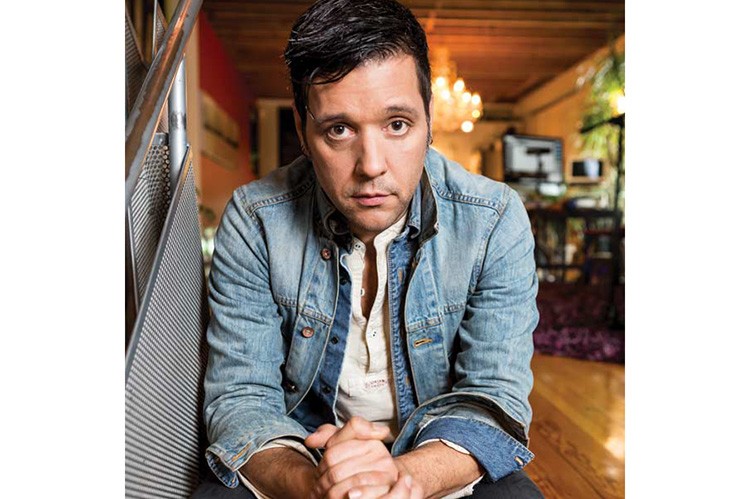
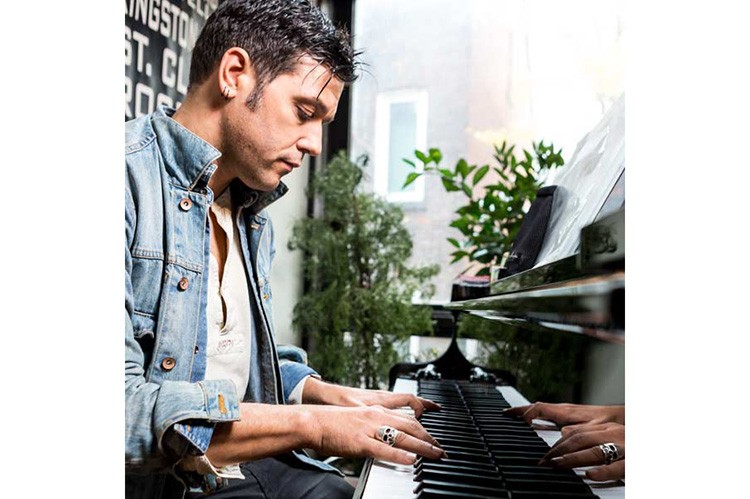
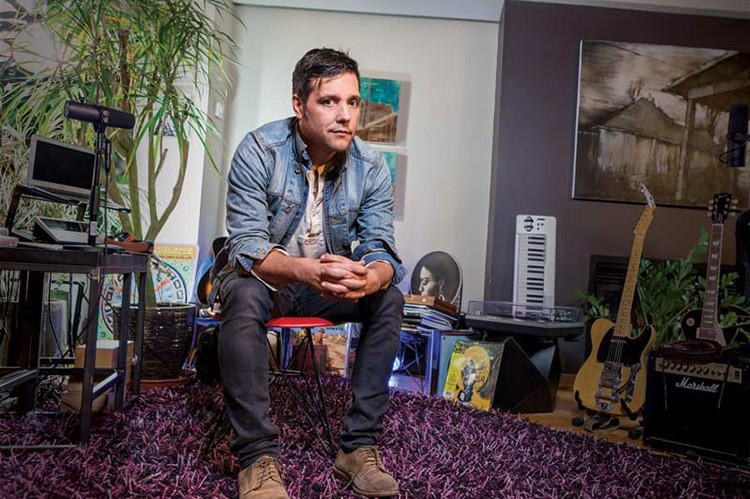
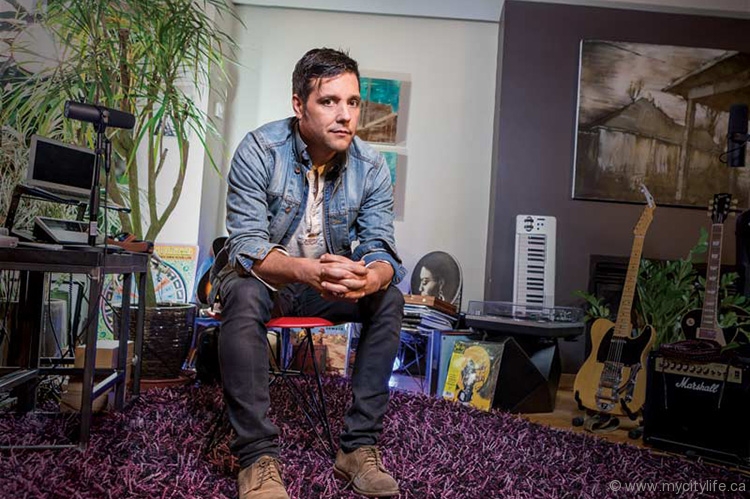




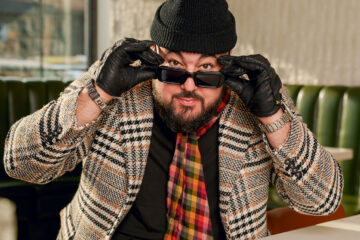

No Comment